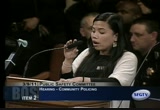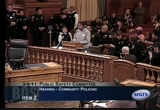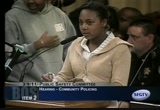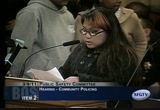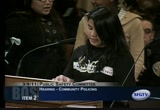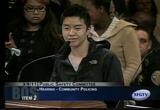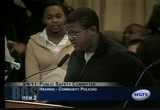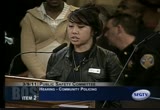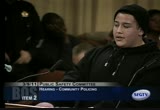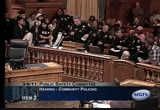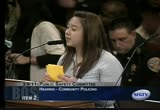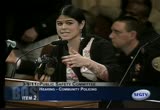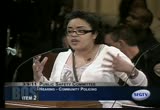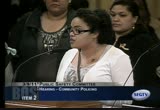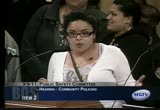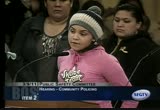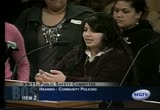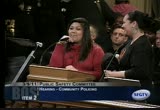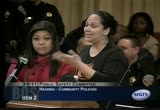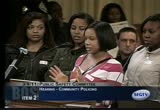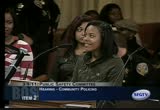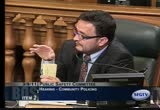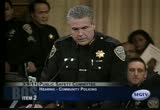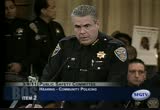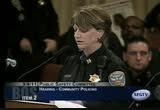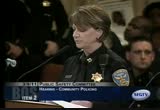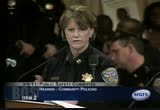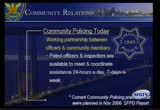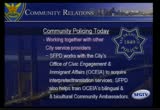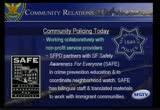tv [untitled] March 12, 2011 2:30pm-3:00pm PST
2:30 pm
community-based organizations. as an integral part of community policing, we want community- based violence prevention programs and access to youth programs. we want all police to be trained in labor relations and working with diverse communities. race, class, age, sex, mental health issues, and so on. there should be an emphasis on serving the community, and not simply fighting crime. we want a more pro-active approach to public safety that holds intervention above reaction. here we are, people that want a safer san francisco who will prove the kind of dedication we can show. we live here and want to play an active role in making sure it is safe for our families, our neighbors, and our communities. in order to have a truly safe
2:31 pm
neighborhood, we need the police. but the police also need us. thank you so much. [applause] supervisor campos: if i may ask the next youth to please come forward. again, if you can bundle your testimony so we move the hearing quickly, thank you very much. do not be nervous. if you can speak into the microphone, raise the mike. thank you. >> my name is nicky hatfield. i am part of the justice program and the neighborhood center. this is what i think community policing should be in our neighborhoods. police should take the initiative to break-barriers. i think it is sometimes an us and them thing, and i want a we environment. i believe in prevention and social justice programs. everyone should have the right
2:32 pm
to feel safe in their neighborhood. supervisor campos: thank you. >> my name is diamond white. i am 15 years old. i go to lowell high school. what i wanted to talk about is when i was researching what community policing was. it pretty much had said that the police officers were respectful to us. but the way i see it, they are not respectful at all when they tied to talk to us and approach us. the police officers pretty much just want to get paid and get it over with. they are not dedicated to helping us youth and the community members. supervisor campos: next speaker. >> good evening, board of supervisors and community. my name is michaela.
2:33 pm
i am 16. i am coordinator in training. i have researched community policing on the internet, and it is a particular area that is being watched by the same policemen so they can be comfortable with the residence. that is a way of reducing crime and violence in that neighborhood. yet i do not see it in a lot of neighborhoods, especially mine. it would be nice if some policemen would be friendlier toward youth. this would help our community have a better relationship toward each other, and that can prevent crime. it would be better if there were more activities going on after school. this would keep the youth occupied and help them learn positive stuff that would also keep them from the streets. the social justice in bernal heights center is a good example. there should be more options for other youth as well. thank you. supervisor campos: next speaker.
2:34 pm
>> hello, board and the community. i am 16 years old. i go to balboa high school. i am also in omi and the social justice program at the neighborhood center. i am here to add my input into what community policing should be in our neighborhood. i think that we want to be -- we want community policing to be focused on prevention rather than intervention. we also want more officers participating in community meetings. that way, we can build relationships between youth and the community and the police as well. thank you. supervisor campos: thank you. next speaker. i would ask -- if you can hold
2:35 pm
your applause so that the hearing can move more quickly, i know that many people are here and want to speak. if you can hold your applause so that the curing can move quickly, thank you. >> my name is joshua will lead. i am 16. i go to lowell high school. supervisor campos: into the microphone, please. >> you guys are not friendly around the neighborhood. you guys are not friendly with the people around the community. you guys walk around and watch the area. i think you should interact with the community a bit more. that is about it. supervisor campos: next speaker, please. >> my name is christopher eng. i am a participant in omi. i would appreciate it if more
2:36 pm
police would walk around the community and got to know us. because right now in my community, i see a few of them walking around, but usually when i pass by, they do not end up saying hello or anything. they just look at you and go away. supervisor campos: thank you. next speaker. next speaker? >> hello. my name is keshaun washington. i am 15. i am here to say there should be more police protection in my neighborhood. where i am from, the last three years i have seen people getting robbed and not reporting to police because they were scared that they would not follow through and catch the people. so just more police protection in my neighborhood would be great. thank you. supervisor campos: next speaker.
2:37 pm
thank you. >> hello. my name is leila ramos, and i am also a participant in omi. my statement would match josh and chris's. police should show up to community events. i feel like if some of us recognize some of their faces at community events we would feel more on a different relationship than how it is if we just see them randomly. supervisor campos: thank you. >> my name is sansa hernandez. something i would like to point out is you know how the law now is that if you are caught on the phone driving you get a ticket? i actually see a lot of police officers doing that when they are driving, on their phone. i actually think that is not right. [applause]
2:38 pm
the visit. -- that is it. >> my name is ramon and i'm with omi. i am here to say that when i am walking on the street, i see cops. i feel, like, offended. every time i walk by, i am scared of the police and think they are going to stab me or something. i just what the police to be trained more so they know how to respond to youth. supervisor campos: thank you very much. next speaker, please. >> hello. my name is wendy. i am a participant in omi. tonight i am here to advocate for my fellow peers about what we would like the police to do in our community. we would appreciate it if there are more police on foot patrol rather than simply driving in their cars, because we know that when you are driving there are
2:39 pm
blind spots in the field of vision that you cannot see. as a result, you can sometimes miss out on what is really going on in the streets. having more police on foot patrol not only makes us feel safer, it also makes us feel less afraid to communicate with you guys. you guys have a stigma of imposing fear on to us. in order to break that stigma, we have to be closer and communicate with each other. thank you. supervisor campos: thank you very much. did you want to add something, chief? chief godown: what i need all these folks to do is this fine officer standing behind me -- we're going to have an upcoming community youth forum and i would like all of you to participate in it. we are trying to get the message out. as you finish speaking, walk over to that officer and he will take your information and you will be invited to an upcoming community youth forum. supervisor campos: thank you. as you finish speaking, make
2:40 pm
sure you sign up. thank you very much. >> hello. my name is malina herrera. i am with the social justice program from bernal heights. this is what i think we need to have really good community policing. it is somebody who comes from within, somebody that walks around, somebody that talks to us, someone that communicates with us and comes to our meetings and talks to us. when the police that -- hey, that is john, my police friend. hey, john, how is it going? someone who always says hello to us, someone we know, a police who can be our friend. i think that is what the youth need. i think you. supervisor campos: thank you very much. before we continue, that was very well done, chief. i also believe the head of the department of public probation is here, as well as someone from
2:41 pm
the mayor's office of criminal justice. >> i was going to reload my memory card. my name is leah white. i am the youth empowerment coordinator for normal heights neighborhood center -- bernal heights neighborhood center. i think the youth represented themselves very well and that is what i would have said it i was the only one speaking here. more community programs would be nice, more involvement with police acting -- interacting with what cbos are doing. we all want to see a separate community. we are doing it in a way that prevents for later on. there is a lot of interaction that happens, but it does not help for another, like -- for where the future of our city is going. "we are trying to look for is a community policing definition that will prevent crime, not only intervene.
2:42 pm
what else? i do not know. i just know that everybody at bernal heights is going to be participating in further conversations to hash out what this means. supervisor >> hello, good evening. i am the case manager with the young queens program, and these are the young queens behind me. young queens is a girl group, and it is a community-based organization, committee center, and we wortwork with highly at k girls coming out of the juvenile justice system, a support program. i'm here to advocate for community policing. we need to conserve and protect
2:43 pm
our community. unfortunately, the police are not serving our community and especially our youth from our neighborhood. instead, we have gangs, racial profiling, and police brutality. with the implementation of the community policing, if it is reinforced, that will create an alliance with the community resources. that is one of my youth, one of these girls gets picked up, instead they are going to their case manager, where we have more leverage, relationships with their family, instead of having the police check them, i can check them and the staff at mission girls can check them. it has more of an effect and equality approach, as opposed to what you see, which does not work. but that is going to close, so that is not very effective. we have bi-weekly all matters to
2:44 pm
prevent the girls from being on the streets, -- we have twice weekly all-snyder's, to prevent the girls from being on the streets. and we stay open late at night. we want to be part of the solution. mission girls must be part of the solution. we don't want to punish our youth, we want to have the rehabilitation, the ballistic outlook. punishing is not work. it just makes people more angry. supervisor campos: thank you. did you want to turn it over to someone else? >> yeah, and we want a chief of police that is a woman. >> hi, my name is breanna hunter, and i am going to talk about a past encounter i had
2:45 pm
with the police. when i was 13, i had an encounter with the police were was mistreated, slammed into the ground, guns drawn on me. i was yelled at, called bad names. i felt like the police were not doing their jobs, there were not doing what they were supposed to do. they were more interested in meeting their quota than protecting our community and doing what is right. after my encounter, i was sent to a facility where i did not feel like i could trust the police, i did not have respect for them because they disrespected me. so i would have rather been taken to the young queens, mission girls, or have a case manager at to talk to all the time and trust and will be there for me and support me and stay out of trouble. so that is all i really want to
2:46 pm
say. thank you. supervisor campos: thank you. ext. speaker? -- next speaker? >> as a youth, you would not think we would want to be involved in this stuff, but since i don't believe the system is right, i want to be involved. as a youth, i want to be taken more seriously, because we are not. as an example, a couple years back, my auntie got into some domestic violence with her boyfriend for the moment and she was not stable enough to call the police. she had me call them. i picked up the phone, 911, you know the procedure, and they told me the family should deal with it within the family and that i should not call because it is not an emergency. and i believe it was an emergency.
2:47 pm
so, yeah. supervisor campos: thank you. thank you for sharing. thank you, mission girls, for being here. make sure that you sign up for that a forum. next speaker, please? >> good evening. i am with united players. supervisor campos: speaking to the microphone. you are doing great. >> i am from galileo high school. >> like supervisor mirkarimi brought up, community policing has been a topic for a while, but i got excited because this is the first time for me that i have heard prevention being part of that equation, so i applaud supervisor campos for bringing
2:48 pm
that to the table. i was state university did a study for how much crime costs, and they found each homicide costs society 17.25 million, and i think if they did that same study in california that would be higher. i applaud you and for being part of this process. i also applaud the acting chief. i think he sat down with service providers and said that he wanted to work together. these are all really positive steps in the right direction, and i urge you to keep this going because there is definitely a segment of society that are not criminals but do not feel safe or protected by the police, and there is a segment of society that does, and we would like to see that gap gets smaller and smaller each day. thank you. supervisor campos: again, thank
2:49 pm
you. we are trying to hear from the youth who have to speak so i can go home and do their homework. any other youth that like to speak, please come forward. it >> i would just like to say that we are from the western addition. even though there is a lot of police interaction, sometimes it is more negative than positive, and we would rather have more positive interaction, not like harassment, we want interaction, positive. thank you. >> thank you. just as she said, although we see the police interacting in the neighborhood, we like to see more what the youth when we put on summer offense. we would like to see participation from them also -- when we put on summer events. >> i just want to say that if we're going to depend on the
2:50 pm
police to keep us safe or rely on them, we should be able to talk to them and be able to trust them. >> hi, i am aiesha, and i think if the police want a better interaction with the youth, they should not harass them. and, yeah. >> hello. my name is chardonnay. supervisor campos: speak into the microphone. >> my name is chardonnay. just as the other girls said about the interaction with the police and the community, just bring more positive energy, and not so much -- not hostile, but
2:51 pm
just not being -- what is bridget intimidating. at not being intimidating to the community and making them afraid of you. like, this is all of our communities. we should be able to come together as one actually, you know, be comfortable with each other, each individual community. and thank you. supervisor campos: thank you very much. is there any other youth that would like to speak? we're going to resume political project general public comment was the presentation is over. this is an opportunity for the youth to speak before they have to go home and do their homework. thank you very much. i want to thank you for coming out to city hall. we saw representation from all over the city. thank you for being out here. your voice is important. chief, thank you for giving them the opportunity so that we could hear from them before continuing
2:52 pm
with the presentation. now i will turn it over to you. >> thank you. i hope that everybody has signed up. quick story, when i was 10 years old, i lived at a location near a driving range, and i had an officer on a motorcycle scare me. he thought i had stolen golf balls from the driving range, which did not happen. my point is i know what it is like to have an officer in uniform stand next to you. i know what is like to have an officer have dialogue with you and how intimidating taken before that to occur. that is something we will work on, be it community policing or customer service. one of the statements i have made, if you look in any of the manuals, the talks about ultimately the community is responsible for solving community problems, in partnership with the police department. it is my philosophy, and i stand
2:53 pm
by this, when a police officer has to put handcuffs on and a member of the community, the system has broken down somewhere, simple as that. when we place handcuffs on somebody in this city, somewhere in that chain, the system has failed. the eatery social system has failed, but the system has failed. -- peter the social system has failed, but the system has failed. we have to work closer with the after-school programs, over and above just foot beats and answering radio calls. i agree with all the youth that came up here and spoke. i am encouraged by them setting up to speak at the community forum. with that, captain freedom to capt. friedman is going to talk about the power point. supervisor campos: the other one, capt.. >> good evening. board members, commissioners, members of the public, and the
2:54 pm
youth members, thank you for coming out and sharing your experiences with us. that is what community policing is all about. i am the commanding officer of our community relations unit, and the members of our unit are here today. we have members that represent almost every community in san francisco. we get out in the community and meet the people we work with. the mission statement for our unit is as liaison between the police department and the diverse communities that we serve. community policing has come a long way. i began my career 28 years ago in a community policing unit of san francisco and later on became a police officer, and it is something that is court what we have done year after year. i think it is improving. there is always room for improvement, but community policing is not something that has just arctic, it has gone on for a long time.
2:55 pm
the cornerstone of our philosophy is the members of the san francisco police department are members of the community. community policing is the core of who we are, and that is why we are happy the youth members came out because they are the leaders of the future. that is who we need to reach, and we need to partner with them, hear their voice, and work towards reducing violence and all the other things we are faced with in san francisco. today's san francisco police dertment members are representative of san francisco police department communities. when i was growing up, girls cannot be crossing guards and they cannot be police officers or firefighters. we have come a long way. community policing is an interactive process between the community and the police department. we have to have an open dialogue, and we have to be willing to sit down and discuss things and agree to disagree to
2:56 pm
break down the barriers. i think the youth coming forward is a wonderful example of community policing and ford in that mission. community policing is the core of what we are in the branches out into many different avenues. but we have advisory boards, the district attorney's committee course, the problem solving, where police trainees and recruits select community projects, blood drives, problem solving, and work to better the communities, and that is from the very moment they enter the police department. monthly community police meetings, the captain's newsletter, station investigative teams. there are investigators in the stations, in the fields, working side by side with the officers in the community and the members of the community they serve. the neighborhood prosecutor program. the chief has an annual summit, with all of the forums, so all
2:57 pm
the groups can get together and discuss the things,. the issues that are in their community. that is really an important -- is really an important forum where the chief gets to hear first hand from those people and the community gets to say what interest. what interests are being addressed. various police advisor reforms to encourage community policing efforts, youth forums, ethnic minority forms, lgbt's, faith based organizations. we invite people to meet with us and the captain said they can break down those barriers and get down to the business of policing san francisco. patrol officers also used 311 systems so we can utilize situation such as the abatement
2:58 pm
campaign. officers can prefer members of the public to 311, so people are not bogged down by the bureaucracy of the many things they need to get done in their neighborhoods. community policing today is all about working together with other city service providers. patrol officers at some assistance for homeless members of our community in need of services. we also work closely with the office of civic engagement and immigrant affairs to acquire interpretation, translation services, and train members of the immigrant affairs for by cultural community ambassador programs. we have a meeting monday where we will share the strategies, explained everything so we can reduce those barriers to communication, and we worked side by side with them translating the forms that we hand out. patrol officers summoned the
2:59 pm
community awareness treatment center when somebody needs a sobering center, somebody who is down and out and they need assistance in that regard. we also partner with the state. we worked very closely with her in our neighborhood watch programs, which is merchants and home security. we also participate and due out reach in the committee. most recently, we were out with the chinese new year, helping the nation committee -- helping the asian community avoid crimes in that timeframe. we maintain an open and transparent program. community policing advisory boards allow them to hold regular meetings with the police chief, and this is important because whatever problems they are facing, they can share with us,pe
93 Views
IN COLLECTIONS
SFGTV: San Francisco Government Television Television Archive
Television Archive  Television Archive News Search Service
Television Archive News Search Service 
Uploaded by TV Archive on

 Live Music Archive
Live Music Archive Librivox Free Audio
Librivox Free Audio Metropolitan Museum
Metropolitan Museum Cleveland Museum of Art
Cleveland Museum of Art Internet Arcade
Internet Arcade Console Living Room
Console Living Room Books to Borrow
Books to Borrow Open Library
Open Library TV News
TV News Understanding 9/11
Understanding 9/11